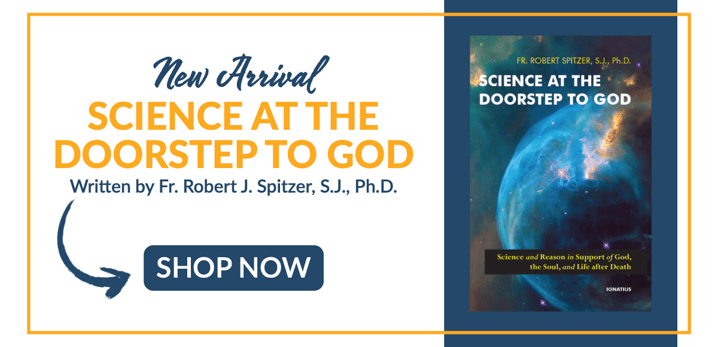Fr. Spitzer and the Magis Center have been at the forefront of efforts to address one of the central debates in contemporary society: the relationship between faith and science.
In his latest book, Science at the Doorstep to God (Ignatius Press, 2023), Fr. Robert J. Spitzer, SJ, argues that current scientific evidence makes the existence of a transcendent dimension to reality “compellingly probable.” A person of any faith or no faith can benefit from reading this book.
The key questions he addresses are organized in six highly readable chapters:
- Chapter 1: Does Science Point to a Beginning of Our Universe?
- Chapter 2: Does Fine-tuning for Life Imply Transcendent Intelligence?
- Chapter 3: Is Theism More Rational Than Atheism?
- Chapter 4: Is There Medical and Scientific Evidence of a Transcendent Soul?
- Chapter 5: Are Human Intelligence and Self-Consciousness Unique?
- Chapter 6: Are We Free Amidst Our Experience of God?
Each chapter addresses hotly debated topics, from cosmological evidence for the beginning of space/time to the existence of a free, conscious, and transcendent soul. The Table of Contents thoroughly summarizes the topics covered within each chapter.
Science at the Doorstep to God Answering Questions
To lay the groundwork to answer these questions, Fr. Spitzer begins his Introduction with a clear explanation of the nature and limits of science. So, within a few pages, the attentive reader will feel confident in answering a burning question: What can science tell us and not tell us about the world?
Just as important is the question: Is science the only reliable way we can know about the world?
Using St. John Henry Newman’s “informal inference,” Fr. Spitzer explains how three separate methods (the scientific method, the metaphysical method, and subjective states such as intuition, self-consciousness, the experience of transcendental desires, etc.) can provide “independently probabilistic evidence” for the same conclusion:
"When we show that there are multiple sets of evidence coming from different methods that complement and corroborate one another in justifying the same conclusion (e.g., the existence of God), it constitutes a strong, reasonable confirmation of that common conclusion." —Fr. Spitzer
Fr. Spitzer presents six sets of scientific and philosophical evidence based on 15 scientific and scholarly studies and one metaphysical proof of God to address the questions asked in the titles of the six chapters.
The reader will learn about the big ideas in cosmology: multiverse theories, entropy, and the fine-tuning of the universe, for example. Additionally, the reader will encounter the fascinating scientific and medical evidence for the existence of the soul and come to understand the meaning of consciousness, language, and the unique character of human intelligence. Building on this information, the reader will confront evidence for the universality of religious experience, the five transcendental desires, and hear arguments for the reality of free will—human actions freely chosen, not predetermined by genetics or environmental inputs.
What are the two related conclusions that a reader can draw from all of this evidence?
- A highly intelligent, transuniversal, transphysical Creator of our universe (or even of a multiverse) exists and is unique, uncaused, and unrestricted.
- Human beings have a transphysical soul capable of surviving bodily death, is self-conscious, and, along with other characteristics, is capable of freely initiated actions that are ethical, empathetic, and loving.
The Reading Experience of Science at the Doorstep to God
Although this book is highly readable, it is a challenging read.
Fr. Spitzer has condensed a significant number of arguments and large amounts of evidence into bite-sized chunks, but the chunks are very dense! Even for readers already familiar with scientific principles and the major arguments in favor of a transcendent view of reality, attentive reading is necessary. The two indices at the end of the book can help the reader keep track of topics and names, and the 16-page bibliography and suggestions for further reading allow more interested readers to go deeper. Laymen, priests, scientists, students—all will benefit from the wealth of information provided in this book.
The world in which we live is an undeniable physical reality with characteristics that enable us to observe, measure, and even manipulate it. The human experience of that reality, however, points to a transcendent, non-material dimension that might seem more elusive. This dual aspect of our experience of the material world is at the heart of Fr. Spitzer’s summary of the compelling evidence for a reality beyond the physical world we see and experience every day.
Purchase your Science at the Doorstep to God copy from the Magis Store today!


